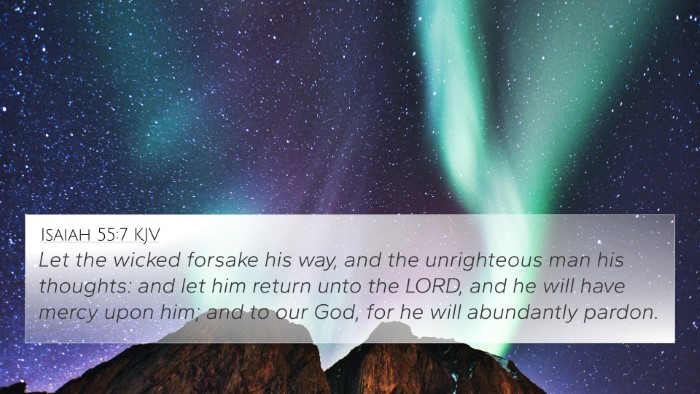Exploring Matthew 18:22: The Message of Forgiveness
Bible Verse: Matthew 18:22 – "Jesus said to him, 'I do not say to you seven times, but seventy times seven.'
Understanding the Context
This verse is part of a larger teaching on forgiveness given by Jesus to His disciples. It highlights the call to exhibit limitless forgiveness, emphasizing that our willingness to forgive should have no boundaries.
Thematic Insights from Public Domain Commentaries
The insights from Matthew Henry, Albert Barnes, and Adam Clarke provide a rich understanding of this verse:
- Matthew Henry:
Henry comments on the nature of forgiveness as reflecting God’s mercy towards us. He emphasizes that we should forgive abundantly, as God forgives abundantly, and that our heart should express a deep commitment to reconciliation, no matter the offense.
- Albert Barnes:
Barnes draws attention to the number of times we are called to forgive. The phrase "seventy times seven" illustrates that our forgiveness should be profound and ongoing. He notes that the frequent repetition signifies a spirit of continuous forgiveness that surpasses human limitations and reflects divine mercy.
- Adam Clarke:
Clarke stresses the importance of mercy in our daily interactions. He interprets this command as a push against the human tendency to keep a record of wrongs. He suggests that true forgiveness encompasses forgetting past offenses, mirroring God’s way of dealing with our iniquities.
Cross-Referencing Biblical Texts
To further understand Matthew 18:22, it can be beneficial to cross-reference with the following biblical texts:
- Luke 17:3-4: Jesus emphasizes forgiving a brother who repents, linking to the idea of ongoing forgiveness.
- Colossians 3:13: This verse instructs us to forgive as the Lord did, reinforcing the concept of unconditional forgiveness.
- Ephesians 4:32: Paul encourages believers to be kind and tender-hearted, forgiving one another, which echoes the message in Matthew 18:22.
- 1 John 1:9: Discusses God’s forgiveness of our sins, thereby encouraging us to extend the same forgiveness to others.
- Matthew 6:14-15: Here, Jesus connects God’s forgiveness of us with our obligation to forgive others, presenting an urgent call to action.
- Mark 11:25: This passage reinforces the idea that forgiveness is essential to receiving forgiveness from God.
- Psalm 103:12: This verse speaks about God removing our transgressions from us as far as the east is from the west, illustrating the nature of divine forgiveness.
Implications of Forgiveness
The implications of this teaching extend to our personal relationships and community life. Each of the cross-referenced scriptures highlights that our practice of forgiveness should be a reflection of divine love and mercy. Those who study these connections may find a deeper understanding of their responsibility towards others and their relationship with God.
Conclusion
Matthew 18:22 stands as a powerful reminder of the endless nature of forgiveness that believers are called to exhibit. As we explore connections between these Bible verses, we glean a fuller picture of God’s expectations and the generous nature of the grace we have received. By engaging in a comparative Bible verse analysis through cross-references, we open ourselves to a transformative understanding of mercy that can enrich our spiritual lives and inter-personal relationships.
Call to Action
For those seeking to delve deeper into the Word or prepare for study, consider utilizing tools for Bible cross-referencing or a Bible concordance that aids in identifying connections between these scriptures. Understanding the breadth of forgiveness can enrich one’s spiritual journey and offer profound insights into the nature of God's command for us to love and forgive as he loves and forgives.













